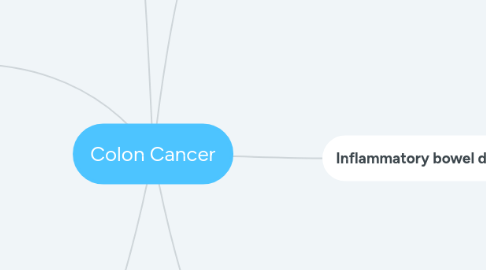
1. Risk Factors
1.1. Diet
1.1.1. High fat, red meat, processed meat
1.1.2. Low fiber
1.1.3. Lack of Vegetables
1.1.4. Heavy alcohol use
1.2. Obesity
1.2.1. Physical inactivity
1.2.2. Type 2 diabetes
1.3. Genetics
1.3.1. FAP - autosomal dominant disorder
1.3.2. Mutation of APC gene on chromosome 5
1.3.3. Hereditary nonpolyposis - autosomal dominant disorder
1.3.4. Family History of colorectal cancer or adenomatous polyps
1.3.5. African Americans and Jews of Eastern European descent
1.4. Ulcerative Colitis and Crohn's Disease
1.5. Smoking
1.6. Age >50
1.7. History of colorectal polyps or colorectal cancer
2. Diagnostic Tests
2.1. Fecal Occult Blood Tesing
2.2. Barium Enema
2.2.1. Radiological exam of colon
2.3. Flexible Sigmoidoscopy
2.4. Colonoscopy
2.4.1. Tissue biopsy
2.5. Stool DNA test
2.6. CT/xray
2.7. Fecal immunochemical test
3. Treatment
3.1. Endoscopic Therapy
3.1.1. Polypectomy and local excision
3.1.2. Electrofulguration
3.1.3. Photodynamic therapy
3.1.4. Colonic Stents
3.2. Surgery
3.2.1. Colon resectoin
3.2.2. Colectomy
3.2.3. Ablation
3.3. Chemotherapy
3.3.1. 5-Flourouracil
3.3.2. Capecitabine
3.3.3. Ironotecan
3.3.4. Oxaliplatin
3.3.5. Trifluridine and tipiracil
3.4. Radiation Therapy
3.5. Immunotherapy
3.5.1. Checkpoint inhibitors
3.5.2. PD-1 inhibitors
3.5.3. CTLA-4 inhibitor
4. Pathophysiologic etiology
4.1. Gene mutation of colonic cells
4.1.1. Inherited gene mutation
4.1.1.1. Familial adenomatous polyposis
4.1.1.1.1. Inherited changes in APC gene
4.1.1.2. Lynch syndrome
4.1.1.2.1. alteration in enzymes which help repair damaged DNA
4.1.1.2.2. Alteration in MLH1, MSH2, MLH3, MLH6, PMS1, and PMS2
4.1.1.3. Peutz-Jeghers syndrom
4.1.1.3.1. changes in tumor suppressor gene STK11
4.1.1.4. MYH-associated polyposis
4.1.1.4.1. mutation of MYH gene
4.1.2. Acquired gene mutation
4.1.2.1. mutation causes inactivation of APC
4.1.2.1.1. Mutational activation of K-ras
4.1.3. hyper proliferation
4.1.3.1. adenomatous polyps
4.1.3.1.1. sever dysplasia
5. Inflammatory bowel disease
5.1. Activation of inflammatory pathways
5.1.1. TNF, prostaglandin E2 overexpression
5.1.1.1. Activation of ERK, NF and PI3k-AKT pathway
5.1.1.1.1. Wnt/B-catenin pathway
5.2. Genotoxic compounds by inflammatory cells Damage cell DNA
5.2.1. Proliferation of macrophages and neutrophils
5.2.1.1. Increase in ROS and RNI mutagens, TNF and IL-1
5.2.1.1.1. mutations in TP53, K-Ras, APC
5.3. Breakdown of protective interstinal barrers
5.3.1. Increased accessibility of inflamed epithelium to food borne and mutagens

